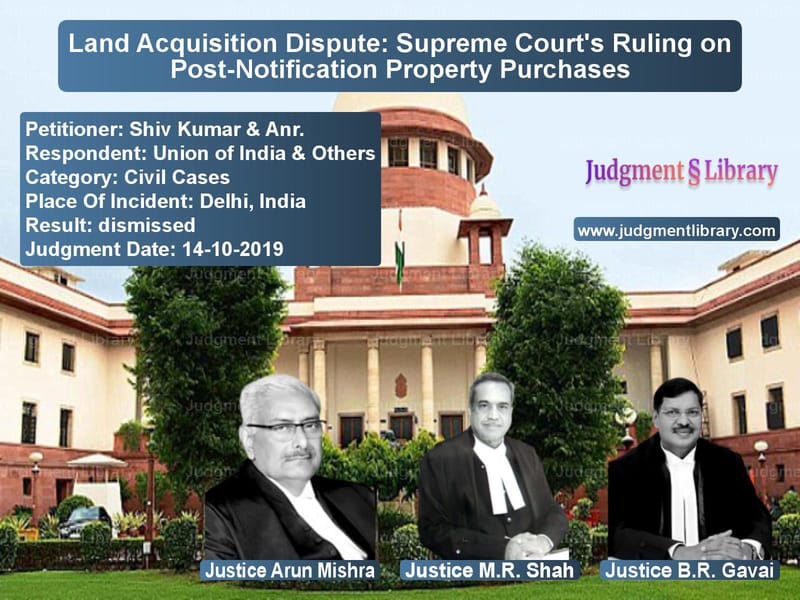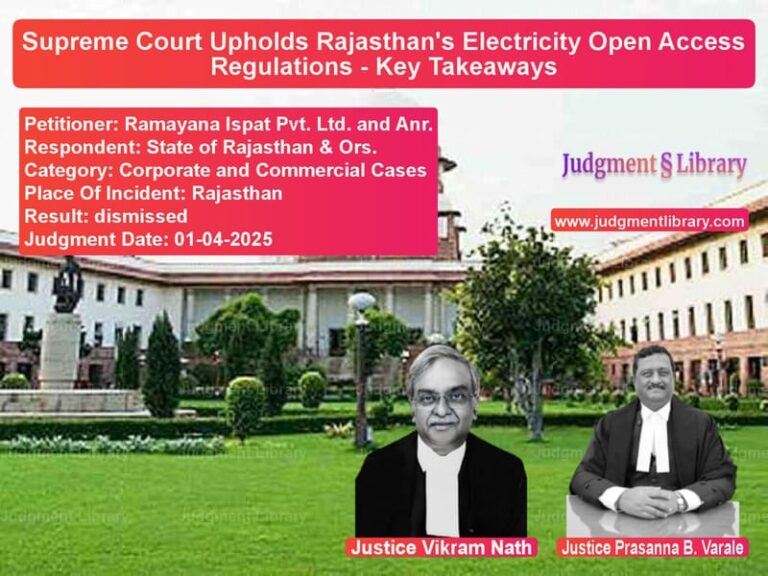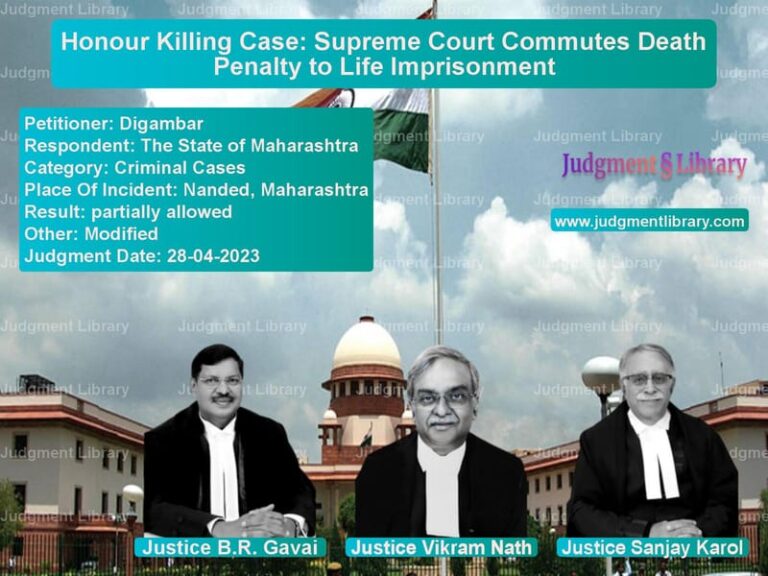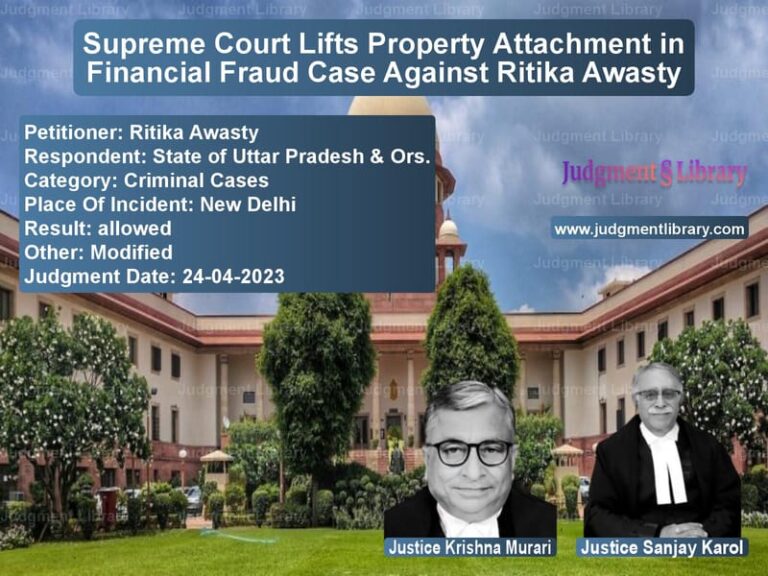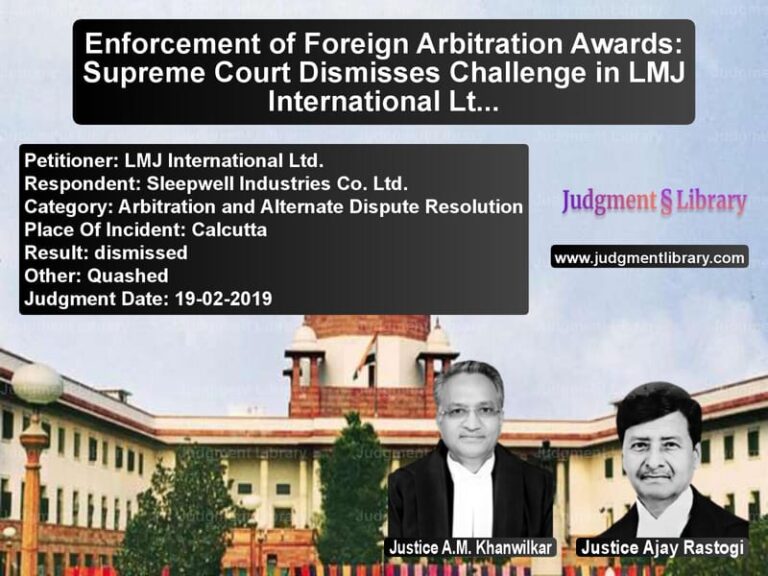Land Acquisition Dispute: Supreme Court’s Ruling on Post-Notification Property Purchases
The case of Shiv Kumar & Anr. vs. Union of India & Others revolved around a significant legal question concerning land acquisition. The primary issue was whether a person who purchases land after the issuance of a notification under Section 4 of the Land Acquisition Act, 1894 could invoke the provisions of Section 24 of the Right to Fair Compensation and Transparency in Land Acquisition, Rehabilitation and Resettlement Act, 2013 (hereinafter referred to as the Act of 2013).
Background of the Case
The dispute arose when a notification was issued on October 27, 1999, for acquiring land in Village Pansali, Delhi, for the Rohini Residential Scheme under the planned development of Delhi. A declaration under Section 6 was issued on April 3, 2000, and possession was taken on May 12, 2000. However, the petitioners purchased the land on July 5, 2001, via a registered sale deed executed by one Satya Narain, a power-of-attorney holder of the original owners.
Following the land acquisition process, an award was passed on April 3, 2002. Meanwhile, the land became part of an unauthorized colony named Deep Vihar, Pansali, which was later provisionally regularized by the Government of the National Capital Territory (NCT) of Delhi. When the Act of 2013 came into force on January 1, 2014, the petitioners sought relief, claiming that since they were in physical possession of the land even after the award, the acquisition should be deemed lapsed.
Petitioners’ Arguments
The petitioners argued the following:
- Despite the land acquisition process, they retained physical possession of the land.
- Their purchase, though post-notification, entitled them to invoke Section 24(2) of the Act of 2013, which states that if physical possession was not taken or compensation was not paid for five years before the enactment of the new law, the acquisition should lapse.
- The High Court erred in dismissing their petition based on their admission that the land was part of an unauthorized colony.
Respondents’ Arguments
The Union of India and other respondents presented the following counterarguments:
- The petitioners purchased the land after the issuance of notifications under Section 4 and Section 6, making their purchase void.
- As per settled legal principles, post-notification purchasers do not have the right to challenge land acquisition proceedings.
- Since possession was already taken by the authorities in 2000, the claim that they continued to occupy the land was false.
- The case of Government (NCT of Delhi) vs. Manav Dharam Trust & Anr., relied upon by the petitioners, was incorrect and went against settled jurisprudence.
Supreme Court’s Observations
The Supreme Court analyzed the case in light of established precedents and observed:
“It is crystal clear that for seeking relief under Section 24, the proceedings for taking possession under the Act of 1894 have been put into question as illusory ones, and possession continues with appellants.”
The Court examined the validity of post-notification sales and reaffirmed:
- Once a notification is issued under Section 4, any subsequent purchase is void against the State.
- A post-notification purchaser has no right to challenge the acquisition proceedings but can only claim compensation.
- Possession taken by the government in 2000 was valid, and any subsequent re-entry by the petitioners into the land was illegal.
Final Verdict
The Supreme Court dismissed the petition, ruling:
- The petitioners, as subsequent purchasers, had no locus standi to challenge the acquisition.
- The reliance on Manav Dharam Trust was incorrect, as that judgment was per incuriam (issued without considering binding precedents).
- Since possession was already taken, Section 24(2) of the Act of 2013 did not apply, and the acquisition had not lapsed.
Legal and Policy Implications
The ruling has significant implications for land acquisition law:
- Post-notification sales are void, and purchasers have no right to challenge acquisition.
- Possession taken by the government cannot be questioned based on subsequent unauthorized occupation.
- Landowners who sell their land post-notification cannot transfer legal rights to purchasers regarding land acquisition disputes.
Conclusion
The Supreme Court’s ruling reaffirms the principle that land acquisition proceedings cannot be invalidated by post-notification purchasers. This decision upholds the sanctity of acquisition processes and ensures that unauthorized transactions do not disrupt government-planned developments. The judgment serves as a precedent for similar disputes, maintaining that land acquisition laws must be applied consistently and fairly.
Petitioner Name: Shiv Kumar & Anr..Respondent Name: Union of India & Others.Judgment By: Justice Arun Mishra, Justice M.R. Shah, Justice B.R. Gavai.Place Of Incident: Delhi, India.Judgment Date: 14-10-2019.
Don’t miss out on the full details! Download the complete judgment in PDF format below and gain valuable insights instantly!
Download Judgment: Shiv Kumar & Anr. vs Union of India & Oth Supreme Court of India Judgment Dated 14-10-2019.pdf
Direct Downlaod Judgment: Direct downlaod this Judgment
See all petitions in Property Disputes
See all petitions in Contract Disputes
See all petitions in Landlord-Tenant Disputes
See all petitions in Judgment by Arun Mishra
See all petitions in Judgment by Mukeshkumar Rasikbhai Shah
See all petitions in Judgment by B R Gavai
See all petitions in dismissed
See all petitions in supreme court of India judgments October 2019
See all petitions in 2019 judgments
See all posts in Civil Cases Category
See all allowed petitions in Civil Cases Category
See all Dismissed petitions in Civil Cases Category
See all partially allowed petitions in Civil Cases Category

